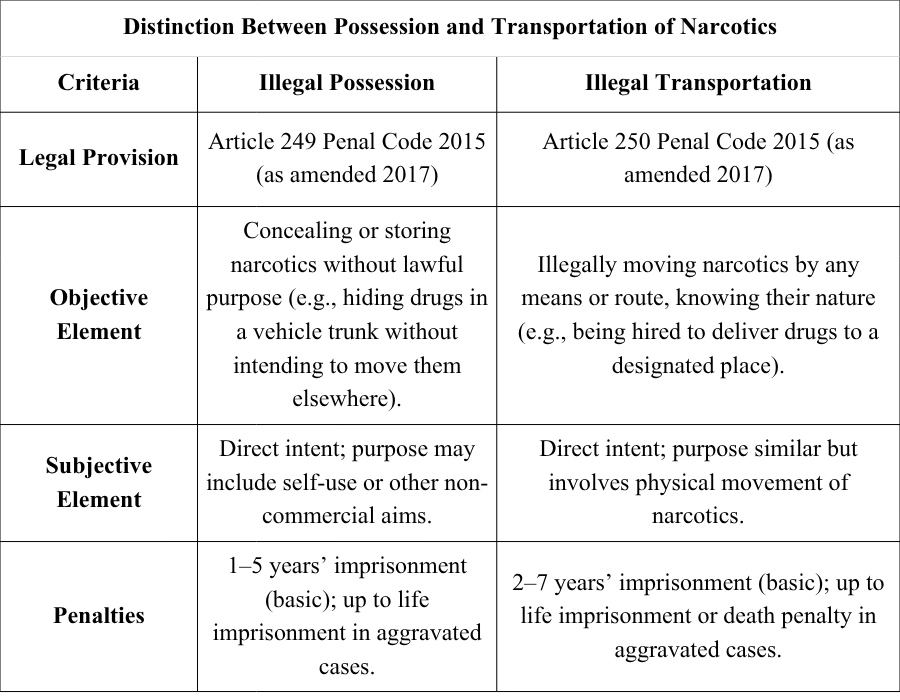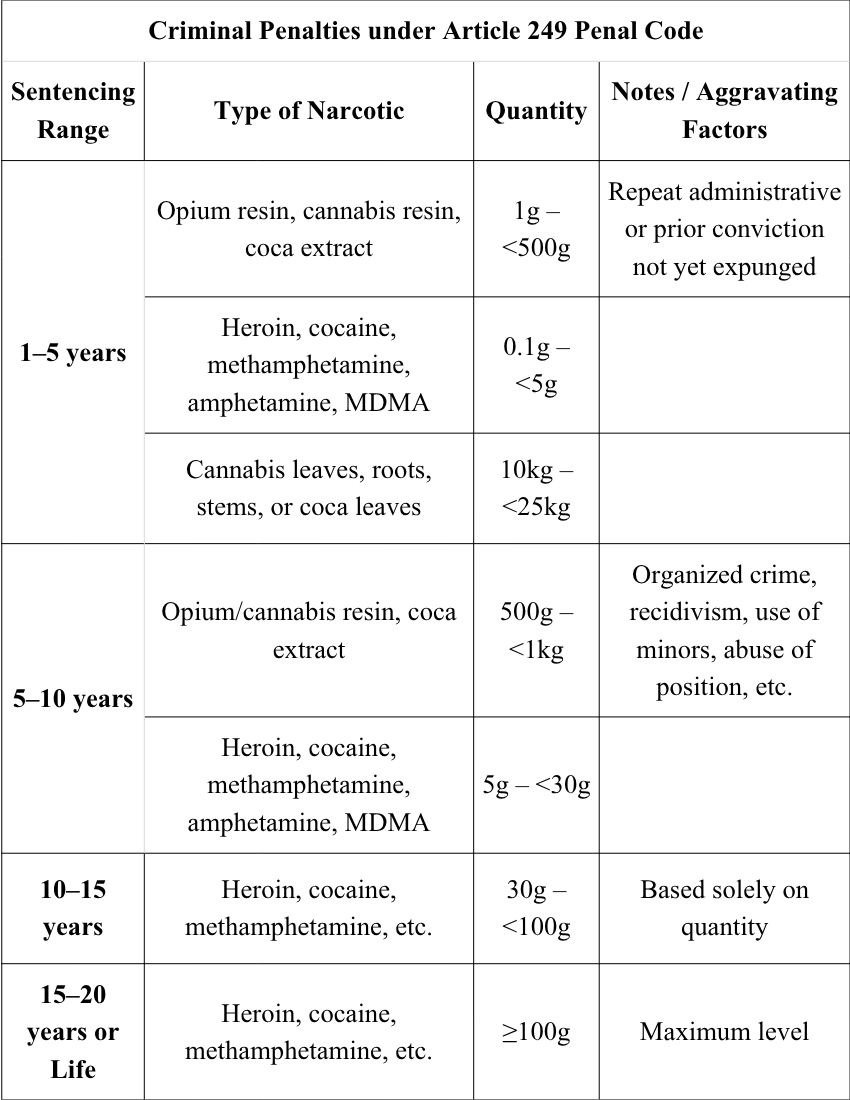Drug Crime in Vietnam | Legal Framework & Defense Strategy
Drug Crime in Vietnam: Illegal Possession of Narcotic Substances – Latest Penalties under Vietnamese Criminal Law (2025 Update)
In recent years, drug-related crimes in Vietnam have become increasingly complex, with offenders employing sophisticated and organized methods. One of the most commonly misunderstood offences is “Illegal Possession of Narcotic Substances.”
Many individuals have been arrested merely for “holding” drugs for others or unknowingly concealing them, unaware that such conduct constitutes a criminal offence. So, what exactly does Vietnamese law provide regarding the offence of illegal possession of narcotics, and what are the latest penalties effective in 2025?
This article, prepared and analyzed by the Criminal Defense Team at An Law Vietnam, aims to clarify the legal framework, penalties, and rights of the accused under current Vietnamese law.
Definition of Illegal Possession of Narcotic Substances
Pursuant to Joint Circular No. 17/2007, “narcotic substances” refer to addictive or psychotropic substances included in the lists promulgated by the Government.
Illegal possession of narcotic substances means the act of concealing or storing narcotics in any place (on one’s person, in a residence, vehicle, bag, etc.) without lawful authorization and not for the purpose of trading, transporting, or manufacturing drugs.
Under Article 249 of the 2015 Penal Code (as amended in 2017 and 2025), individuals whose acts meet all constituent elements of the offence shall be held criminally liable.
Legal Basis
The following instruments govern the offence of illegal possession of narcotics in Vietnam:
- Penal Code 2015, as amended in 2017 and 2025
- Criminal Procedure Code 2015
- Decree No. 144/2021/NĐ-CP on administrative sanctions in the field of security and public order
- Resolution No. 02/2018/NQ-HĐTP, as amended by Resolution No. 01/2022/NQ-HĐTP, guiding the application of suspended sentences
- Law on Drug Prevention and Control 2021 and its implementing regulations
- Amended Penal Code 2025, introducing the new offence of Illegal Use of Narcotic Substances
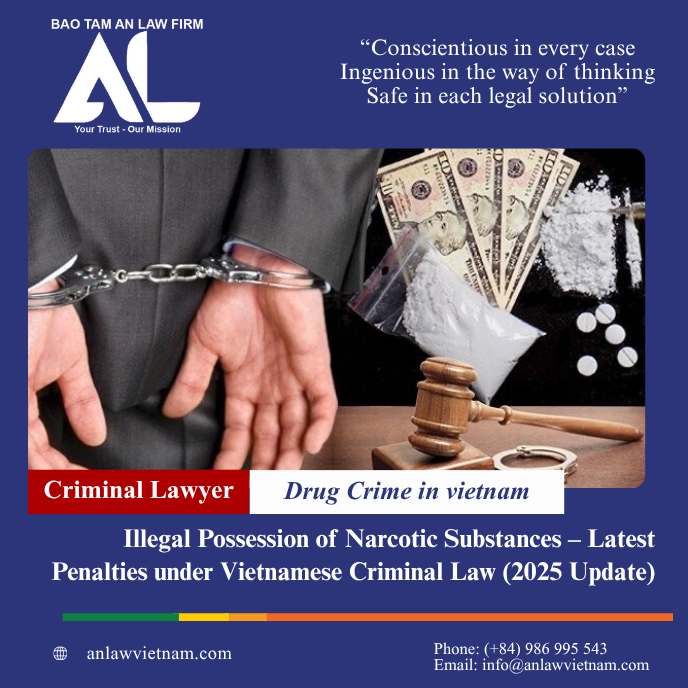
Constituent Elements of the Offence
Subject (Perpetrator)
The offender is any individual with criminal capacity. Persons aged from 14 to under 16 shall bear criminal responsibility only if the offence is serious or particularly serious.
In summary:
➟ Any person with full criminal capacity may be charged.
➟ Juveniles (14–16 years) are criminally liable only for serious or particularly serious cases.
➟ Object (Protected Interest)
The offence infringes upon the State’s regime of management and control over narcotic substances.
➟ Objective Element (Conduct)
Illegal possession consists of concealing or retaining narcotics in any form without lawful authorization and without intent to trade, transport, or manufacture.
→ The offence is established once the act and intent to possess are proven; no specific harmful consequence is required.
➟ Subjective Element (Fault)
The offender acts with direct intent, being fully aware that possession of narcotics is unlawful and socially dangerous, yet deliberately carrying out such conduct.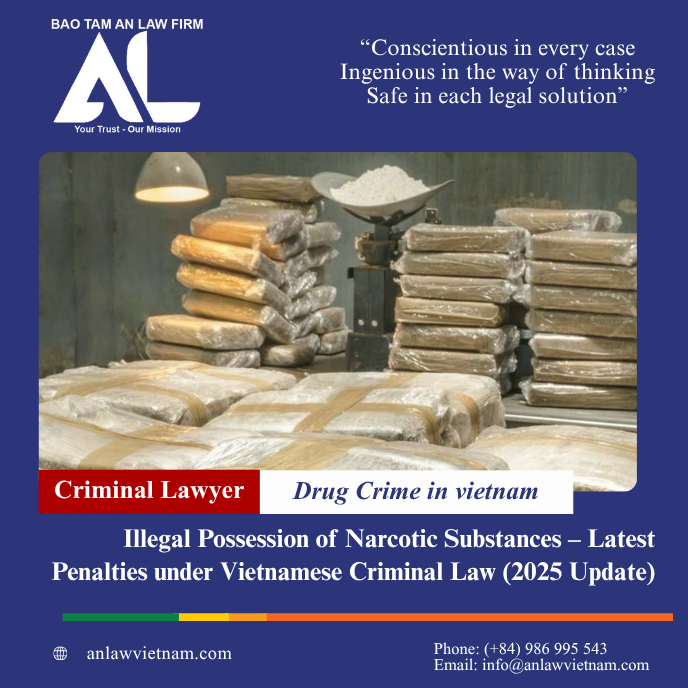
Distinction Between Possession and Transportation of Narcotics
Note: The distinction must be made carefully based on specific facts of time, location, and conduct.
Administrative Sanctions
Where the act does not reach the threshold of criminal liability, offenders may be administratively sanctioned as follows:
➟ A fine ranging from VND 2,000,000 to 5,000,000 (per Point a, Clause 2, Article 23 of Decree 144/2021/NĐ-CP);
➟ Confiscation of related exhibits and means;
➟ Foreign nationals may additionally be expelled from Vietnam.
Criminal Penalties under Article 249 Penal Code
The offence of illegal possession of narcotic substances (without intent to trade, transport, or manufacture) is punishable as follows:
Additional Penalties:
➟ Fine from VND 5 million to 500 million;
➟ Prohibition from holding certain positions or practicing professions for 1–5 years;
➟ Confiscation of part or all of assets.
Death Penalty: Under the 2025 Amendment to the Penal Code, the offence of illegal possession of narcotics no longer carries the death penalty, regardless of the quantity involved. The maximum penalty is life imprisonment.
Eligibility for Suspended Sentence
A suspended sentence (án treo) may be considered if the offender:
➟ Receives a sentence of not more than 3 years’ imprisonment;
➟ Has a good personal record;
➟ Possesses multiple mitigating circumstances and few aggravating ones;
➟ Has a clear place of residence and shows potential for rehabilitation.
Lawyer’s Commentary:
In practice, suspended sentences for drug possession cases are rare. They are usually granted only where the quantity is minimal, the offender is genuinely remorseful, and the defense counsel successfully demonstrates exceptional mitigating factors.
New Offence: Illegal Use of Narcotics (Article 256a – Penal Code 2025)
The 2025 Amendment introduces a new offence:
➟ 2–3 years’ imprisonment: for those undergoing compulsory rehabilitation or substitution therapy who continue to use narcotics;
➟ 3–5 years’ imprisonment for repeat offenders.
This marks a major shift from administrative handling to criminalization of narcotics use.
Criminal Procedure Process for Narcotics Offences
- Initiation of criminal proceedings (Article 143 Criminal Procedure Code)
- Investigation – verification of evidence, origin, and parties involved
- Prosecution – issuance of indictment by the Procuracy
- Trial – first-instance and appellate hearings
- Execution of sentence
- Review procedures – cassation or reopening review
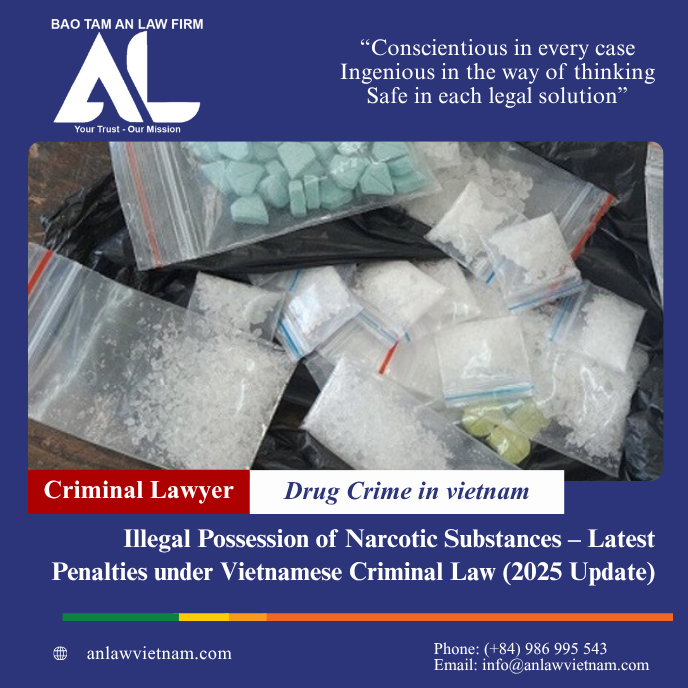
Legal Commentary & Recommendations from An Law Vietnam
Vietnamese law strictly penalizes narcotics-related offences but also upholds principles of fairness and humanitarian justice applicable to both citizens and foreign nationals.
In many cases, defendants may have been coerced, unaware of the nature of the substance, or merely holding it temporarily for another person — such factual details are crucial for the defense counsel to clarify during proceedings.
Foreign nationals involved in narcotics offences may face criminal prosecution, administrative penalties, and expulsion.
Recommendations:
➟ If you or your family member is under investigation or prosecution for a narcotics-related offence in Vietnam, or if you seek a criminal defense lawyer for foreign nationals, contact An Law Vietnam immediately for timely, confidential, and professional legal assistance.
➟ With extensive experience defending complex criminal cases — particularly those involving drug crimes, theft, and robbery — our lawyers are dedicated to safeguarding the lawful rights and interests of our clients, especially foreign defendants in Vietnam.
➟ Early involvement of a qualified criminal defense lawyer is the key to ensuring a strategic, lawful, and effective defense.
Contact – An Law Vietnam (Criminal Defense for Narcotics Offences)
📞 Phone: (+84) 986 995 543
📧 Email: info@anlawvietnam.com
📍 Head Office: Diamond Plaza, 34 Le Duan Street, Sai Gon Ward, Ho Chi Minh City
🏢 Vung Tau Branch: Vo Thi Sau Street, Vung Tau Ward, Ho Chi Minh City
Note: This article is for reference purposes only. As Vietnam’s legal policies may change over time, the information provided above may no longer be applicable in certain specific cases. For any questions or comments, please contact An Law Vietnam for timely assistance.
Related Articles:
Compilation of the Latest Guiding Instruments on the Criminal Code – 2025 Update
Drug Crime In Vietnam – Criminal Code (Amended And Supplemented In 2025)
Drug Crime in Vietnam – Typical Examples
Penalties for Foreigners Using Drugs in Vietnam – Understanding the Legal Risks
Can Foreigners Be Deported For Illegal Drug Use In Vietnam?
Drug Crime in Vietnam: Illegal Possession of Narcotic Substances – Latest Penalties under Vietnamese Criminal Law (2025 Update)

